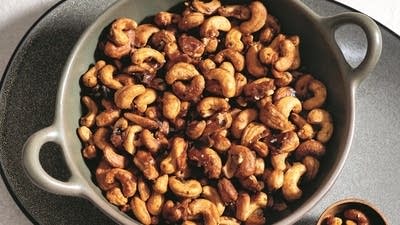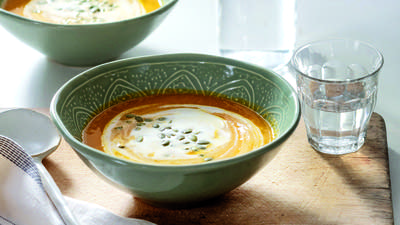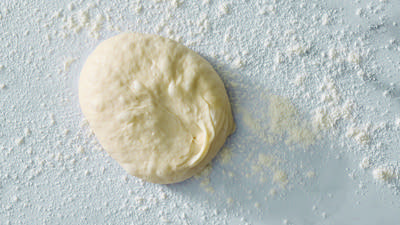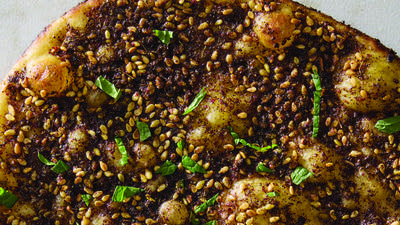From Three Guys from Miami Cook Cuban: 100 Great Cuban Recipes with a Touch of Miami Spice by Glenn Lindgren, Raul Musibay and Jorge Castillo (Gibbs Smith Publishers, 2004). © 2004 by Glenn Lindgren, Raul, Musibay and Jorge Castillo. All rights reserved.
Prep time: 20 min, plus time to marinade
Cook time: Dependent on cooking method
Total time: Varies
Yield: Servings are based on the size of the ham. Allow 1/4 to 1/2 pound per person, (portion sizes may very depending on the size of the persons involved, degree of hunger, and the number of side dishes).
Many butchers in other parts of the United States call fresh ham a "green ham." Just make sure you ask for un-smoked or unprocessed ham with the skin still on. That's the most important part - you need the skin and the layer of fat underneath.
Ingredients
1 bone-in fresh ham with skin on (or have your butcher butterfly it for you)
Mojo (recipe follows)
Mojo (Cuban Marinade):
8 to 10 cloves garlic
1/2 teaspoon salt
1/2 teaspoon freshly ground black pepper
1 teaspoon dry oregano
3/4 cup sour orange juice (see note)
Instructions
1. To marinate, pierce pork as many times as you can with a sharp knife or fork. Pour Mojo over pork, cover, and let sit in refrigerator at least 2 to 3 hours or preferably overnight.
2. Select one of three different cooking methods:
To roast in the oven: Preheat oven to 450 degrees F. Place the pork, fattest side up, in an open roasting pan. Place pan in oven and reduce temperature to 325 degrees F. Occasionally spoon extra Mojo over the roast as it cooks. Remove roast from oven when the internal temperature reaches 155 degrees F. on a meat thermometer. Immediately cover with foil and let rest for 10 minutes before slicing and serving. The roast will continue to cook after you remove it from the heat. A perfectly cooked pork roast will be slightly pink to pale white in the middle and the juices will run clear.
To grill on the barbecue: Use a covered grill such as the Weber kettle or a covered gas grill. Bank the coals to each side of the covered grill, leaving an empty space beneath your ham. If using a gas grill, use front and rear burners only. The idea is to cook with indirect heat. Spoon extra Mojo over the roast occasionally as it cooks. If not using a gas grill, add charcoal to the sides as needed to maintain roasting temperature. Remove roast from the barbecue when the internal temperature reaches 155 degrees F. on a meat thermometer. Immediately cover with foil and let rest for 10 minutes before slicing and serving. The roast will continue to cook after you remove it from the heat. A perfectly cooked pork roast will be slightly pink to pale white in the middle and the juices will run clear.
To cook on the stovetop: Place ham in a large Dutch oven or a covered stock pan - whatever you have that the pork will fit in. Add 1 cup of Mojo to the pan. Bring to a boil. Adjust the heat to low, cover, and cook until completely done. Add marinade as needed to keep at least 1 inch of liquid in bottom of pan; otherwise the roast will burn.
Mojo (Cuban Marinade)
There are many variations of mojo. It is the signature marinade of Cuba and it finds its way into many different dishes. Some mojos include oil. However, when you are roasting pork or a whole pig, the oil is not necessary - there's plenty of fat in the pig.
The key to making mojo is in the proportions. Keep all the dry ingredients in approximately the proportions of the basic recipe above and you can't go wrong! And the nice thing is, you can make exactly the amount you need.
The key element is sour orange, an almost bitter orange that grows throughout Cuba. Many Cubans brought the sour orange to South Florida, where it also flourishes. It's hard to find in many parts of the country. You can buy some at many Latin groceries or online in bottles.
Note: For Lynne's approximation of sour orange, add the juice of half a large lime per 2/3 cup regular orange juice.
1. Use a mortar and pestle. Add the garlic, salt, pepper and oregano. Mash them all together into a paste.
2. Scoop the paste out into a separate bowl. Stir in the sour orange juice.
3. Let sit at room temperature for 30 minutes or longer. Use immediately or refrigerate for later use.
Before you go...
Each week, The Splendid Table brings you stories that expand your world view, inspire you to try something new, and show how food connects us all. We rely on your generous support. For as little as $5 a month, you can have a lasting impact on The Splendid Table. And, when you donate, you’ll join a community of like-minded individuals who love good food, good conversation, and kitchen companionship. Show your love for The Splendid Table with a gift today.
Thank you for your support.
Donate today for as little as $5.00 a month. Your gift only takes a few minutes and has a lasting impact on The Splendid Table and you'll be welcomed into The Splendid Table Co-op.



